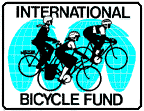Risk Assessment for Travel in Africa
WE WOULD LOVE
YOUR SUPPORT!
Our content is
provided free
as
a public service!
![]() IBF is 100%
IBF is 100%
solar powered
![]()
Due to current reports on spot problems in Africa, perhaps you are a bit hesitant to bicycle there. As a responsible program specializing in Africa, with decades of experience, we would like to ease your mind. While Africa is not without its problems, if you are selective about where and when we travel or tour there are great rewards. The general information on Africa misrepresents how safe, serene and welcoming the continent as a whole has been, and continues to be.
The fact is, the most common threats to travelers in Africa, are the same as they are for travelers anywhere in the world. To help you have a safe trip and minimize some of the risks here are some recommended precautions:
It is a big world and there are always a few individuals who don't want to play by the common set of rules. African cities, like any other large cities, can have their share of purse-snatchers, pickpockets, con men and muggers. People shoving pieces of paper in your face (and then their hands in your pockets), suggesting you give them a little money so they can return with a bounty of cash (as soon as they duck around the corner) or offering you drug-laced drinks (including on buses and trains) are not practicing any sacred culture, so you don't have to be culturally sensitive in return -- be assertive back!
Worldwide, please be cautious and alert when walking in towns. The safety of an evening stroll should be inquired about before pursuing. Unless you specifically know the city you are in, walking at night is not recommended. It is often wise to take taxicabs for journeys after dark. Do not carry your passport, large sums of money or other valuables unnecessarily, and avoid carrying or wearing bags, cameras or valuable jewelry that can be easily snatched. Beaches are another place where tourists are targeted so similar precautions are warranted.
More of a threat than aggressive people is the traveler's own behavior. When traveling you will constantly be in a physical environment that is new to you and personal accidents are more likely to happen: steps, stairs and ladders may be uneven; floors, decks, passages, platforms, gangways, jet ways, (especially on planes, trains, boats, buses and other moving objects), pavement, boardwalks, rocks, wet clay soil, sand, loose gravel, rocks, logs, cliffs, slopes and anything underfoot may provide unstable footing or bicycling; and, furniture, structures, bicycles, low eaves, branches from vegetation, rocks, spikes, low ceiling beams and other hard objects, can all cause injury. This isn't everything that can be a hazard and we cannot anticipate or be responsible for the circumstances or actions created and controlled by others, so please take your time and be cautious as you move about.
For more information about the country(s) that you will be visiting, there are some websites that post risk assessments and several countries "travel warnings". Links to these are available on the travel page of our link section.
Have a safe trip!
More complete information is available in these publications:
Bicycling In Africa: A highly praised, comprehensive how-to book for bicycle touring in Africa or any place else.
Bicycling In Africa Country Supplements: Detail country-by country supplements to "Bicycling In Africa" covering cycling seasons, routes, getting maps and spare parts, accommodations in rural areas and special comments for cycling in the respective countries.
Country-by
-Country Resources:
Algeria
Benin
Botswana
Burkina Faso
Cameroon
Cote d'Ivoire
Dem. Rep of Congo
Djibouti
Egypt
Eritrea
Ethiopia
Gambia
Ghana
Guinea
Kenya
Madagascar
Malawi
Mali
Mauritania
Morocco
Mozambique
Niger
Nigeria
Senegal
Sierra Leone
Sudan
Somalia
South Africa
Tanzania
Togo
Tunisia
Uganda
Zaire
Zambia
Zimbabwe
For current news on Africa and more web sites with country-by-country information go to the link section and click on "Africa: News, Background, Travel."
Home | About Us | Contact Us | Contributions | Economics | Education | Encouragement | Engineering | Environment | Bibliography | Essay Contest | Ibike Tours | Library | Links | Site Map | Search
![]()
The International Bicycle Fund is an independent, non-profit organization. Its primary purpose is to promote bicycle transportation. Most IBF projects and activities fall into one of four categories: planning and engineering, safety education, economic development assistance and promoting international understanding. IBF's objective is to create a sustainable, people-friendly environment by creating opportunities of the highest practicable quality for bicycle transportation. IBF is funded by private donation. Contributions are always welcome and are U.S. tax-deductible to the extent allowed by law.
![]()
![]() Please write if you have questions, comment, criticism, praise or
additional information for us, to report bad links, or if you would like to be
added to IBF's mailing list. (Also let us know how you found this site.)
Please write if you have questions, comment, criticism, praise or
additional information for us, to report bad links, or if you would like to be
added to IBF's mailing list. (Also let us know how you found this site.)


